
Find Help
More Items From Ergsy search
-

Can diet influence hay fever symptoms?
Relevance: 100%
-

What are the common symptoms of hay fever?
Relevance: 84%
-

What is hay fever?
Relevance: 81%
-

Can hay fever symptoms mimic other conditions?
Relevance: 79%
-
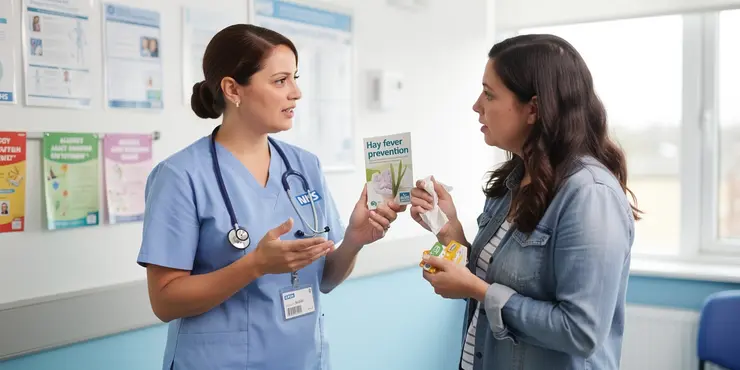
Can hay fever be prevented?
Relevance: 78%
-
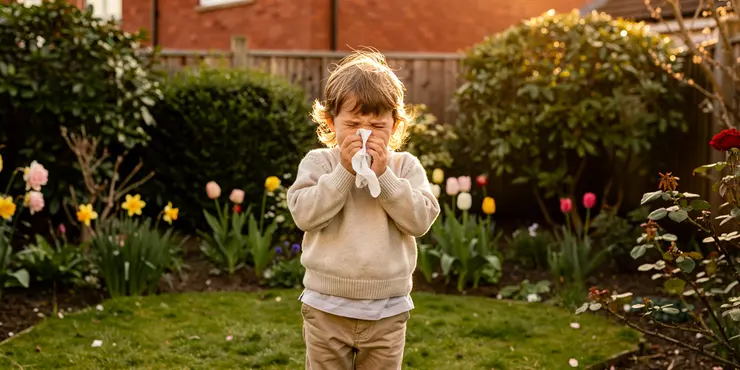
Can children develop hay fever?
Relevance: 75%
-

Hay fever advice | NHS
Relevance: 74%
-
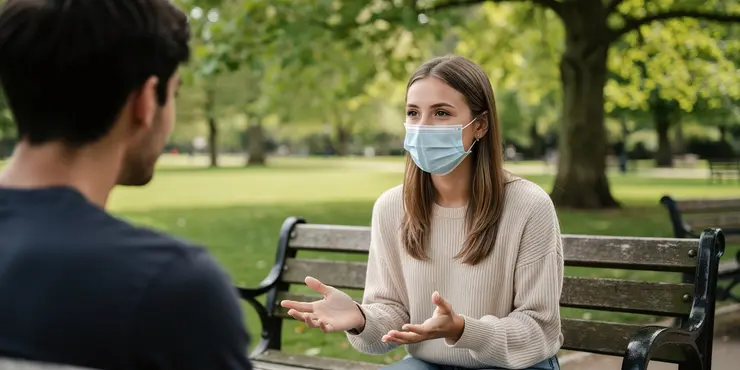
Do masks help with hay fever?
Relevance: 74%
-
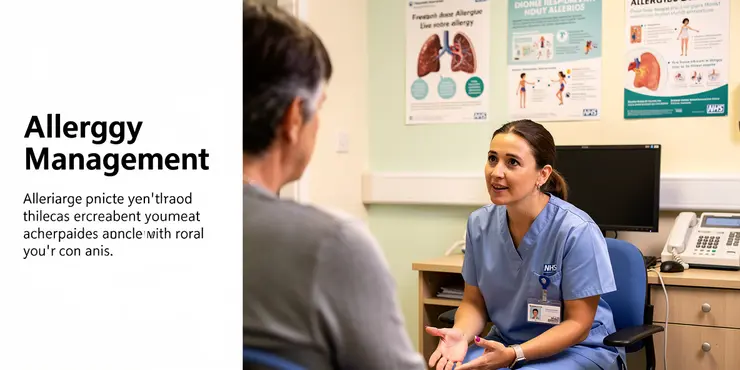
Is there a link between hay fever and asthma?
Relevance: 74%
-
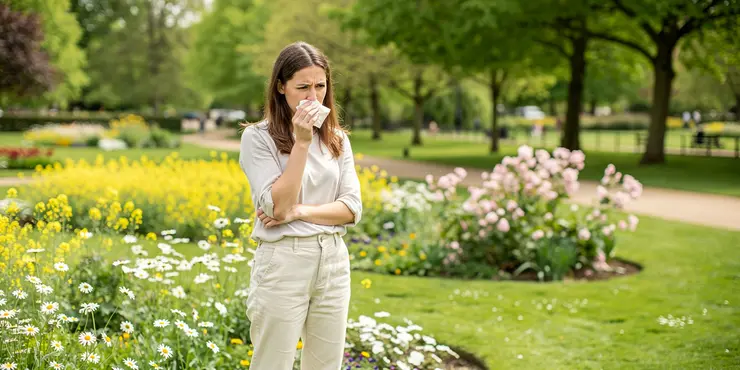
Are some people more prone to hay fever?
Relevance: 73%
-

Can hay fever occur year-round?
Relevance: 72%
-

Is hay fever more common in urban areas?
Relevance: 70%
-

Do pets contribute to hay fever?
Relevance: 70%
-

Can mosquito screens help reduce hay fever symptoms?
Relevance: 70%
-
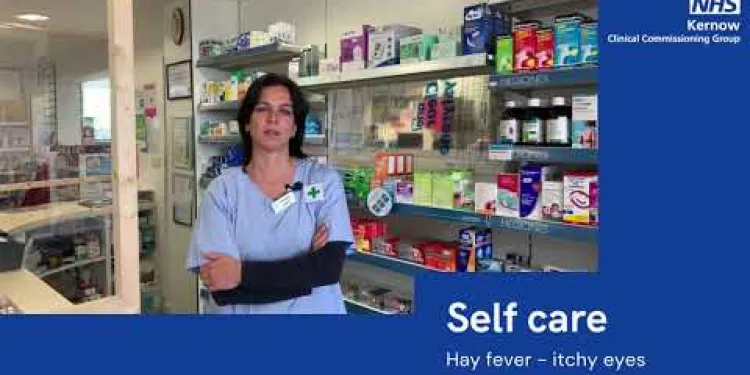
Self care - hay fever itchy eyes
Relevance: 69%
-

Antihistamines how they work with hay fever
Relevance: 69%
-

Do all plants produce pollen that causes hay fever?
Relevance: 69%
-

Why are experts warning of rising hay fever cases?
Relevance: 69%
-
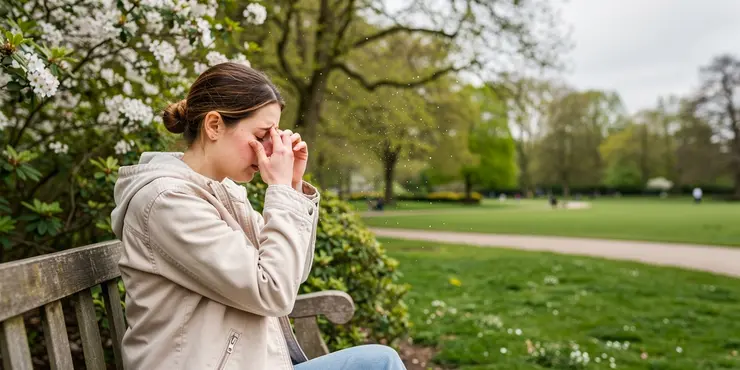
How does pollen affect people with hay fever?
Relevance: 68%
-

Experts Warn of Rising Hay Fever Cases as Pollen Counts Surge
Relevance: 66%
-

Are there any treatments for hay fever?
Relevance: 53%
-

How long does a typical hay fever season last?
Relevance: 46%
-
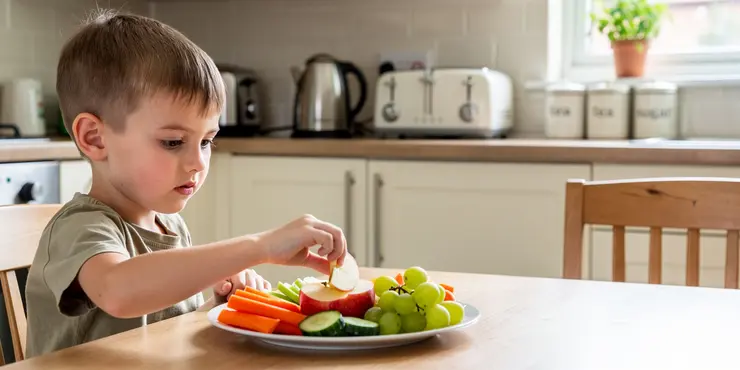
Can diet affect ADHD symptoms?
Relevance: 38%
-

How to treat glandular fever | NHS
Relevance: 33%
-

Can lifestyle changes help manage pain and fever during pregnancy?
Relevance: 32%
-

Caring for a child with fever | NHS
Relevance: 32%
-

Can dengue fever be contracted in the UK?
Relevance: 30%
-

Is there a risk of yellow fever being spread by mosquitoes in the UK?
Relevance: 30%
-

Which medication should be avoided for children with fevers?
Relevance: 30%
-
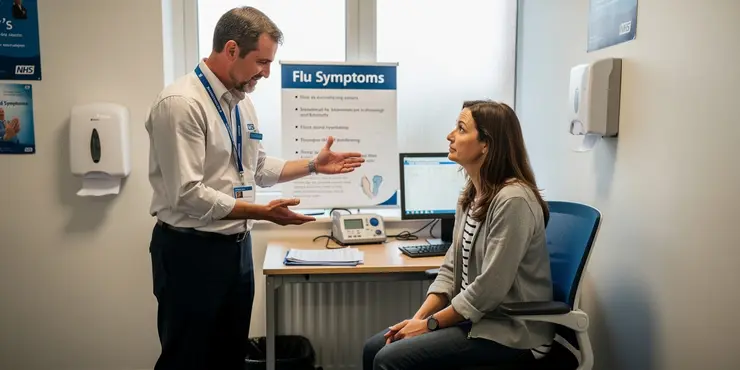
What are the symptoms of flu ?
Relevance: 28%
-

What are the symptoms of measles?
Relevance: 28%
-

What are the symptoms of Rubella?
Relevance: 28%
-

Can diet affect psoriasis?
Relevance: 28%
-

What are the symptoms of measles?
Relevance: 28%
-

What are the common symptoms of a cold?
Relevance: 27%
-

Can diet affect asthma?
Relevance: 27%
-

Can diet impact BPH?
Relevance: 27%
-

What are the symptoms of chickenpox?
Relevance: 27%
-

Can diet affect eczema?
Relevance: 27%
-

What are the symptoms of measles?
Relevance: 27%
Understanding Hay Fever
Hay fever, also known as allergic rhinitis, is a common condition that affects a significant portion of the UK population. It's caused by an allergic reaction to pollen, typically from trees, grass, or weeds, leading to symptoms such as sneezing, a runny nose, itchy eyes, and congestion. These symptoms can considerably impact daily life, especially during the pollen-heavy seasons from spring to autumn.
The Role of Diet in Managing Symptoms
There is growing interest in how dietary choices might influence the severity of hay fever symptoms. While no diet can cure hay fever, specific foods and nutrients might help alleviate or exacerbate symptoms through their effects on the immune system and inflammation.
Anti-inflammatory Foods
A diet rich in anti-inflammatory foods might help reduce hay fever symptoms. Omega-3 fatty acids, found in oily fish such as salmon and mackerel, have anti-inflammatory properties. Incorporating these into your diet may potentially reduce nasal inflammation caused by hay fever.
Fruits and vegetables high in antioxidants, such as berries, apples, and greens, can aid in combating oxidative stress in the body. Vitamin C, abundant in citrus fruits, also acts as a natural antihistamine, potentially easing symptoms.
Foods to Avoid
Certain foods might worsen hay fever symptoms for some people, particularly those with oral allergy syndrome (OAS). This condition causes the immune system to mistake proteins in some fruits and vegetables for pollen, leading to itching or swelling in the mouth. Common triggers include apples, melons, and carrots.
Dairy products might contribute to mucus production, which could exacerbate nasal congestion. Some individuals report relief from hay fever symptoms when reducing their intake of dairy.
The Importance of a Balanced Diet
Maintaining a healthy and balanced diet is crucial for overall well-being and can support immune function. Incorporating various nutrients helps ensure the body has the resources to manage allergic reactions effectively. Keeping hydrated is also important, as it helps maintain mucous membrane health, potentially relieving some symptoms associated with hay fever.
Conclusion
While altering your diet is not a standalone solution for managing hay fever, being mindful of your nutrition can play a role in alleviating symptoms. Those who experience severe symptoms should consult healthcare professionals for tailored advice. Each individual's response to dietary changes varies, and what works for one person may not work for another. Combining dietary strategies with other treatments like antihistamines or nasal sprays may provide the best results.
What is Hay Fever?
Hay fever is a health problem that a lot of people in the UK have. It happens when you are allergic to pollen. Pollen comes from plants like trees, grass, or weeds. This makes you sneeze, your nose run, your eyes itch, and your nose feel blocked up. Hay fever can make life hard, especially in the spring, summer, and early autumn.
How Food Can Help with Hay Fever
People are interested in how what we eat might help hay fever. No food can stop hay fever, but some foods might help make the symptoms better or worse. This is because they can change how our immune system and swelling in our body work.
Foods That May Help
Eating foods that fight swelling might help hay fever. Foods with omega-3, like salmon and mackerel, might make your nose feel less swollen.
Fruits and vegetables with antioxidants, like berries, apples, and greens, help your body. Oranges and other citrus fruits have Vitamin C, which can act like natural medicine to help symptoms.
Foods You Might Want to Avoid
Some foods can make hay fever worse for some people. This happens because their body thinks some fruits and vegetables are like pollen. This can make their mouth itch or swell. Foods that can do this include apples, melons, and carrots.
Dairy products, like milk, might make more mucus. This can make your nose feel more blocked. Some people feel better when they eat less dairy.
Eating a Healthy Diet
Eating healthy and balanced food is important. It helps you stay well and keeps your body strong to fight hay fever. Drinking enough water is also important because it keeps your nose and throat healthy and might help with symptoms.
Final Thoughts
Changing your food won't stop hay fever, but it might help. If you have bad symptoms, talk with a doctor for advice. Different foods work for different people. It's good to try these food tips with other treatments, like medicine or sprays, to feel better.
Frequently Asked Questions
Can diet influence hay fever symptoms?
Yes, diet can influence hay fever symptoms. Certain foods can either exacerbate or alleviate symptoms.
What foods can worsen hay fever symptoms?
Foods like dairy, eggs, soy, and nuts can worsen hay fever symptoms in some people due to potential allergens.
Are there foods that help reduce hay fever symptoms?
Yes, foods rich in omega-3 fatty acids, antioxidants, and vitamin C can help reduce inflammation and alleviate symptoms.
How do omega-3 fatty acids help with hay fever?
Omega-3 fatty acids may help reduce inflammation, which can ease hay fever symptoms.
What are some good sources of omega-3 for reducing hay fever?
Good sources include fish like salmon and mackerel, flaxseeds, chia seeds, and walnuts.
Can vitamin C help with hay fever symptoms?
Yes, vitamin C is a natural antihistamine and antioxidant that can help reduce hay fever symptoms.
Which fruits are high in vitamin C to help with hay fever?
Oranges, strawberries, kiwis, and bell peppers are high in vitamin C and can help mitigate hay fever symptoms.
Can herbal teas help with hay fever symptoms?
Herbal teas like chamomile or nettle tea may have anti-inflammatory properties that can help alleviate symptoms.
Is honey effective in reducing hay fever symptoms?
Some believe that locally sourced honey can help desensitize the body to local pollen allergens, though more research is needed.
Can probiotics help with hay fever?
Probiotics may help by supporting gut health and the immune system, potentially reducing hay fever severity.
Are there any dietary changes that can improve hay fever symptoms?
Eliminating potential allergens and increasing intake of anti-inflammatory foods can improve symptoms.
Can dehydration worsen hay fever symptoms?
Yes, staying hydrated helps thin mucus and can alleviate some hay fever symptoms.
How does alcohol consumption affect hay fever?
Alcohol, especially beer and wine, may worsen hay fever due to histamine content and its dehydrating effects.
Can spicy foods affect hay fever symptoms?
Spicy foods can temporarily clear nasal passages but might worsen long-term symptoms in sensitive individuals.
Should I avoid dairy to reduce hay fever symptoms?
Some individuals find that dairy increases mucus production, but this varies from person to person.
Can a low-histamine diet help with hay fever?
A low-histamine diet might reduce symptoms for some people, as histamines can exacerbate allergies.
What foods are low in histamine?
Fresh meat, poultry, eggs, and certain fresh fruits and vegetables are generally low in histamine.
How can antioxidants help with hay fever?
Antioxidants can reduce oxidative stress and inflammation, helping to lessen hay fever symptoms.
What are some antioxidant-rich foods to include for hay fever?
Berries, nuts, leafy greens, and dark chocolate are rich in antioxidants that can help relieve symptoms.
Is there a connection between gut health and hay fever?
Yes, a healthy gut microbiome can enhance immune function and potentially reduce allergy symptoms, including hay fever.
Can the food we eat change hay fever symptoms?
Hay fever is when you sneeze and have an itchy nose or eyes because of pollen or dust.
Some people say that the food we eat can help with hay fever.
This means eating fruits and vegetables might make you feel better.
If you have hay fever, try talking to a doctor or nurse. They can help you find the best foods to eat.
You can also try keeping a food diary. Write down what you eat and how you feel after.
Yes, what you eat can change how bad your hay fever is. Some foods can make it worse, and some can make it better.
Which foods can make hay fever worse?
Some foods can make hay fever worse for some people. Foods like milk, eggs, soy, and nuts might cause problems because they have things called allergens.
Can some foods help with hay fever?
Hay fever makes you sneeze and have a runny nose.
Some foods might help you feel better.
Here are some ideas:
- Try eating more fruits like apples and oranges.
- Eat vegetables like carrots and broccoli.
- Drink lots of water to help your body.
Ask a grown-up or a doctor for more help if you need it.
Yes, some foods can help when you're feeling sore. Fish with omega-3, berries with antioxidants, and oranges with vitamin C are good choices to help you feel better.
How can omega-3 help with hay fever?
Omega-3 is a type of healthy fat.
It is good for your body and can help with hay fever.
Hay fever is when you sneeze and your nose itches because of things like pollen.
Omega-3 can help by calming down swelling in your body.
Eating fish like salmon or using omega-3 supplements can be good for this.
If you have trouble reading, you can ask someone to help you.
Omega-3 fatty acids can help reduce swelling. This might make hay fever feel better.
What foods have omega-3 to help with hay fever?
Here are some foods that have omega-3. Omega-3 can help with hay fever symptoms:
- Fish: Eat fish like salmon, sardines, or tuna.
- Seeds: Try chia seeds or flaxseeds.
- Walnuts: Have a handful as a snack.
You can also use pictures of these foods to help remember them. Talking with a helper like a doctor or dietitian can also be a good idea. They can give advice that helps you.
Good foods are fish like salmon and mackerel. Also, flaxseeds, chia seeds, and walnuts are helpful.
Can vitamin C help with hay fever symptoms?
Does vitamin C help when you have hay fever? Hay fever makes you sneeze, have itchy eyes, and a runny nose.
Vitamin C is in oranges and other fruits. It might help with hay fever.
Here are some things you can try:
- Eat fruits like oranges or drink orange juice.
- Talk to a doctor about vitamin C tablets.
If you have trouble reading, ask someone for help. You can also use apps that read text out loud.
Yes, vitamin C can help with hay fever. It is natural and can lower sneezing and itching. It also helps keep your body healthy.
What fruits have lots of vitamin C to help with hay fever?
Oranges, strawberries, kiwis, and bell peppers have a lot of vitamin C. Eating them can help if you have hay fever.
Do herbal teas help with hay fever?
Drinking herbal teas like chamomile or nettle tea might help when your body is sore or swollen. They can sometimes make you feel better.
Does honey help with hay fever symptoms?
Some people think that eating honey from nearby can help people get used to pollen in the air. But more studies are needed to know if it really works.
Can good bacteria help with hay fever?
Some people take tiny living things called good bacteria to stay healthy. They might help with hay fever, which makes you sneeze and have itchy eyes.
If you're wondering if good bacteria can help you, ask a doctor or talk to an adult you trust. You can also read about it with someone who can help you understand.
Probiotics can help make your tummy healthy. They can also make your body stronger to fight off sickness, like hay fever.
Can eating different foods help with hay fever?
Some foods might help with hay fever. Eating fruits and vegetables can be good. Drinking lots of water can help too.
Ask a doctor or nurse for more help. They can tell you what to eat.
Using a calendar might help. Mark down how you feel after eating different foods. This can help you find out what works best for you.
Eating less of the foods that might cause allergies and eating more foods that help the body feel better can help you feel better.
Can being thirsty make hay fever worse?
Drinking water helps make mucus thinner. This can help reduce some hay fever symptoms.
How does drinking alcohol affect hay fever?
When people drink alcohol, it can make hay fever worse. Hay fever is when your nose gets runny and your eyes itch because of things like pollen.
Alcohol can make these problems worse. This is because alcohol has stuff in it called histamines, which can cause hay fever symptoms.
If you have hay fever, be careful with alcohol. You can try drinking less or choosing drinks with fewer histamines, like some spirits. If you're not sure, ask an adult or a doctor for advice.
Alcohol, like beer and wine, can make hay fever worse. This is because it has something called histamine in it and can make your body lose water.
Can spicy foods make hay fever worse?
Some people wonder if eating spicy food can change how bad their hay fever feels.
Here are some tips to help:
- Try eating different foods to see how you feel.
- Keep a diary of what you eat and how you feel after.
- Talk to your doctor or a nurse if you have questions.
Remember, everyone is different. What works for one person might not work for you.
Spicy foods can help you breathe better for a short time. But if your nose is very sensitive, they might make things worse later.
Can cutting out milk and cheese help with hay fever?
Some people think that drinking milk or eating dairy makes more mucus. But it is different for each person.
Can eating foods with less histamine help with hay fever?
Hay fever makes you sneeze and have a runny nose.
Some people say eating foods with less histamine might help.
Talk to a doctor or a dietitian before changing your diet.
You can also use apps to help you learn more about low-histamine foods.
A low-histamine diet might help some people feel better because histamines can make allergies worse.
Which foods have little histamine?
Some foods do not have much histamine. These foods can be good for people who need to eat less histamine.
- Rice
- Quinoa
- Fresh chicken
- Fresh fish
- Eggs
- Apples
- Pears
- Carrots
- Broccoli
- Zucchini
When choosing food, it is helpful to:
- Make a list of foods with low histamine.
- Try new recipes with these foods.
- Ask for help if you are unsure.
Fresh meat, chicken, eggs, and some fresh fruits and vegetables usually don't have much histamine.
How do antioxidants help with hay fever?
Antioxidants are good for you. They help protect your body. Some people say antioxidants can help with hay fever.
What is hay fever?
Hay fever makes you sneeze and have a runny nose. It comes from pollen and other things in the air.
How do antioxidants help?
Antioxidants can protect your body from getting hurt. They might help you feel better if you have hay fever.
Supportive tools and techniques:
- Use simple words when talking about hay fever.
- Look at pictures of things that cause hay fever, like flowers, to understand better.
- Ask a grown-up or a doctor to explain more if you have questions.
Antioxidants help your body feel better. They fight bad stuff called oxidative stress and inflammation. This can make hay fever symptoms less bad.
What foods can help with hay fever?
Some foods can help you feel better if you have hay fever. These foods have things called antioxidants.
Here are some foods you can eat:
- Fruits: Eat apples, oranges, and berries.
- Vegetables: Try carrots, spinach, and peppers.
- Nuts and Seeds: Almonds and sunflower seeds are good choices.
If reading is tough, try using pictures to help you understand. You can also ask someone to read with you.
Berries, nuts, green leaves, and dark chocolate are good for you. They have special stuff called antioxidants that can help you feel better.
Does your tummy affect hay fever?
Your tummy is where food goes to be digested. Keeping it healthy is important. Some people think a healthy tummy can help with hay fever.
Hay fever gives you itchy eyes and a runny nose when there's pollen. Pollen is tiny and comes from plants.
To help, eat healthy foods like fruits and vegetables. This keeps your tummy and body strong.
You can also ask a grown-up or a doctor for more help with hay fever.
Yes, having a healthy tummy with lots of good germs inside can help make your body's defenses stronger and might help reduce allergy problems like hay fever.
Useful Links
This website offers general information and is not a substitute for professional advice.
Always seek guidance from qualified professionals.
If you have any medical concerns or need urgent help, contact a healthcare professional or emergency services immediately.
Some of this content was generated with AI assistance. We’ve done our best to keep it accurate, helpful, and human-friendly.
- Ergsy carfully checks the information in the videos we provide here.
- Videos shown by Youtube after a video has completed, have NOT been reviewed by ERGSY.
- To view, click the arrow in centre of video.
- Most of the videos you find here will have subtitles and/or closed captions available.
- You may need to turn these on, and choose your preferred language.
- Go to the video you'd like to watch.
- If closed captions (CC) are available, settings will be visible on the bottom right of the video player.
- To turn on Captions, click settings .
- To turn off Captions, click settings again.
More Items From Ergsy search
-

Can diet influence hay fever symptoms?
Relevance: 100%
-

What are the common symptoms of hay fever?
Relevance: 84%
-

What is hay fever?
Relevance: 81%
-

Can hay fever symptoms mimic other conditions?
Relevance: 79%
-

Can hay fever be prevented?
Relevance: 78%
-

Can children develop hay fever?
Relevance: 75%
-

Hay fever advice | NHS
Relevance: 74%
-

Do masks help with hay fever?
Relevance: 74%
-

Is there a link between hay fever and asthma?
Relevance: 74%
-

Are some people more prone to hay fever?
Relevance: 73%
-

Can hay fever occur year-round?
Relevance: 72%
-

Is hay fever more common in urban areas?
Relevance: 70%
-

Do pets contribute to hay fever?
Relevance: 70%
-

Can mosquito screens help reduce hay fever symptoms?
Relevance: 70%
-

Self care - hay fever itchy eyes
Relevance: 69%
-

Antihistamines how they work with hay fever
Relevance: 69%
-

Do all plants produce pollen that causes hay fever?
Relevance: 69%
-

Why are experts warning of rising hay fever cases?
Relevance: 69%
-

How does pollen affect people with hay fever?
Relevance: 68%
-

Experts Warn of Rising Hay Fever Cases as Pollen Counts Surge
Relevance: 66%
-

Are there any treatments for hay fever?
Relevance: 53%
-

How long does a typical hay fever season last?
Relevance: 46%
-

Can diet affect ADHD symptoms?
Relevance: 38%
-

How to treat glandular fever | NHS
Relevance: 33%
-

Can lifestyle changes help manage pain and fever during pregnancy?
Relevance: 32%
-

Caring for a child with fever | NHS
Relevance: 32%
-

Can dengue fever be contracted in the UK?
Relevance: 30%
-

Is there a risk of yellow fever being spread by mosquitoes in the UK?
Relevance: 30%
-

Which medication should be avoided for children with fevers?
Relevance: 30%
-

What are the symptoms of flu ?
Relevance: 28%
-

What are the symptoms of measles?
Relevance: 28%
-

What are the symptoms of Rubella?
Relevance: 28%
-

Can diet affect psoriasis?
Relevance: 28%
-

What are the symptoms of measles?
Relevance: 28%
-

What are the common symptoms of a cold?
Relevance: 27%
-

Can diet affect asthma?
Relevance: 27%
-

Can diet impact BPH?
Relevance: 27%
-

What are the symptoms of chickenpox?
Relevance: 27%
-

Can diet affect eczema?
Relevance: 27%
-

What are the symptoms of measles?
Relevance: 27%


